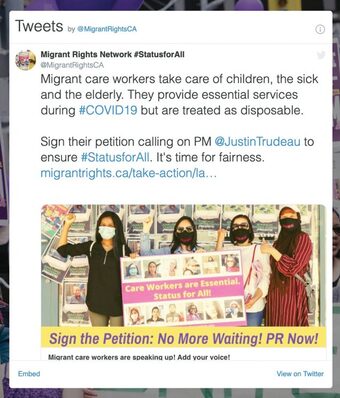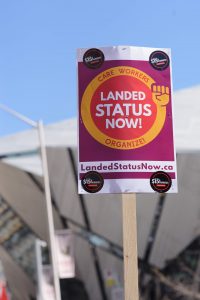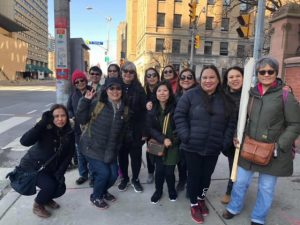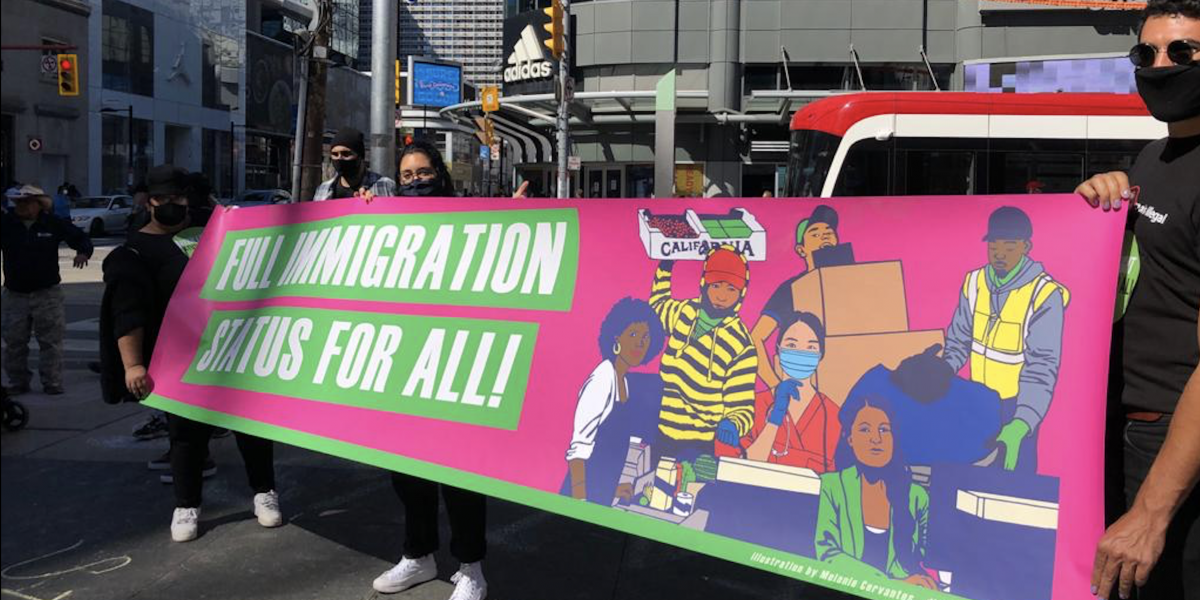0 Comments
 April 6, 2021 Veronica Silva Cusi The Philippine Reporter Caregivers in Canada, mostly migrant workers, are intensifying their campaign to demand reforms as some provinces in Canada are in the third wave of the COVID-19 pandemic. The Migrant Rights Network (MRN), a coalition of migrant workers supporters that include care workers, launched on April 6, an online petition to collect thousands of signatures which they plan to present to Prime Minister Justin Trudeau and Immigration Minister Marco Mendicino on Mother’s Day on May 9.  In Toronto, among the care workers groups spearheading the campaign are the Careworkers Connections Education and Support Organization (CCESO) and Caregivers Action Centre (CAC). CAC hosted an online planning meeting last March to finalize their demands and write up their petition. Martha Ocampo, a volunteer with CCESO, said in an interview with The Philippine Reporter, that the campaign is not new. “But since the start of the pandemic, there have been issues experienced by care workers. We want to remind the Prime Minister the demands he needs to attend to.” “They have been saying (that) yes, they do acknowledge that care workers are essential workers, that they have done so much, especially during this pandemic. Yet they are not doing [enough] in terms of the demands being asked by care workers,” she added. In the online petition at LandedStatusNow.ca, the main demand is “full and permanent immigration status for all not just for themselves but all migrants.” Other demands are: • No more waiting for PR processing • No English language requirements • No education accreditation requirement • No more tied work permits • Reunite families For Ocampo, she said she has been active in the campaign for landed status since the 1980s with the Foreign Domestic Movement (FDM), which was renamed the live-in caregiver program in the 1990s with mainly the same requirements: two years of experience and live-in service. The LCP is now “closed to new applicants” and other caregiving options are available to foreigners who would like to get permanent residence in Canada by doing care work. She added that some of the requirements for care workers to get permanent residency – such as English language and education — are “irrelevant to the skills they are providing.” “If they [care workers] have worked here [in Canada] for two years, and the employers like them, why do they still need this language requirement which is very, very high?” Under the Interim Pathway for Caregivers Program, which closed in October 2019, the minimum score required is Canadian Language Benchmark 5 for all abilities: reading, writing, speaking and listening. Ocampo said they have heard of caregivers who have failed the tests so many times. “The minute they go into the [testing] room, they are so nervous” they fail the test. Care workers have also been demanding prompt action on their PR applications. MRN stated in the petition that the current backlogged applications are at least 9,100. And this backlog has been ongoing even before COVID-19, added Ocampo. As soon as eligible care workers complete the requirements, they can apply for PR status for an opportunity to be reunited with their families. But care workers have been separated from their families for a long time. “One day is too long; … they need to be reunited with their families,” said Ocampo. “Families are the natural support for people facing depression (and) stress. You don’t want them going to the hospital because they have mental health issues. If they have their family here, the family will be giving them the support. The Prime Minister and Immigration Minister have to understand the importance of family reunification.” Ocampo said the pandemic crystallized the inequities experienced by the vulnerable workers like care workers. “… For as long as we don’t have a national strategy for childcare, the elderly and the disabled, they [families] will always need care workers. … This might be a good time to push the Prime Minister to do something.” Last November, caregiver groups released a report about alleged abuses and exploitations that caregivers have experienced during the pandemic. The online campaign, and maybe even in-person paper campaign in other parts of the country with loose COVID-19 restrictions, is expected to culminate on Mother’s Day, May 9. Ocampo said that in Toronto, depending on COVID-19 restrictions, they might present the petition to the office of Minister Mendicino, who is Member of Parliament for Eglinton-Lawrence. ——————————- Veronica Silva Cusi is a multimedia journalist and researcher with more than two decades of experience. She was a business journalist (editor and researcher) for 12 years with BusinessWorld in the Philippines and a journalism university lecturer for 14 years at University of the Philippines. She also worked as editor and reporter in Singapore before migrating to Canada. Some media she has worked for include Computerworld Philippines, Singapore/Malaysia, and The Filipino Channel (North America). She’s been covering ethnic media in the GTA for more than a decade now. Veronica holds two master’s degrees — Communication Research from the University of the Philippines and journalism from Ryerson University. You can follow her on Twitter @VSilvaCusi. Please visit : https://philippinereporter.com/index.php/2021/04/09/care-workers-intensify-campaign-for-protection-reforms-as-covid-19-hits-third-wave/?fbclid=IwAR1DN7w29WVZfmI_r3H3pjrpjatpBQkAbrzvb9Iy8fQnPGAweAXmJojhPUM By Spring Magazine On September 20, 2020, over 150 people – including migrants, refugees, undocumented people, workers, and students – rallied at Toronto’s Yonge-Dundas Square in support of full and permanent immigrant status for all. The Status for All actions were coordinated by the Migrant Rights Network, Canada’s migrant justice coalition. In Toronto, organizations and individuals gathered at all corners of the Yonge-Dundas intersection in a vibrant and energetic show of support and solidarity. Actions also took place in Fredericton, Hamilton, Kitchener, Montréal, Ottawa, St. Catharines, St. John’s, and Sudbury. Actions were held in Vancouver and Kelowna on September 18. In Canada, over 1.6 million people are non-permanent residents. Migrants are either undocumented or on various work, study, or humanitarian permits. Many migrants are excluded from universal healthcare, access to emergency income, human rights and employment protections, and decent work. Speaking out and advocating for themselves can result in termination from employment, deportation, and homelessness. As a result of the COVID-19 pandemic, many migrant workers, refugees, students, and undocumented people have lost their lives and sources of income. Granting status would recognize migrants as deserving of basic human rights and other legal protections, as well as healthcare and social assistance. Migrant care workers Several speakers delivered messages at the rally. Kim Smith, a migrant care worker, addressed the group with a clear message: “Status for all means that we will not be separated from our families and that we can have basic human rights. COVID-19 has worsened existing inequalities for migrants, refugees, undocumented people, workers, and students. We have been shut out of emergency income support, healthcare, and social services, while at the same time are forced to keep working. Status for all allows us to protect ourselves from victimization and discrimination from our bosses. Without status, as migrants, we are exposed and vulnerable, afraid to speak up. We want green light status for all.” Marlyn Lulham, a member of Caregiver Connections, Education and Support Organization (CCESO), told the rally, “This pandemic highlights the need for care work as essential and permanent work. Granting permanent residency for all care workers and those under temporary work permits will ensure that Canada will never again have a shortage of people with skills that are deemed essential care work.” Lulham echoed the call to action: “We demand full, permanent immigrant status to all immigrants, irrespective of present immigration status. Many migrants, including foreign workers, care workers, and temporary foreign workers, have become undocumented and unable to assert their rights to refuse unsafe work as a result of their lack of permanent resident status. We say, ‘good enough to work, good enough to stay’. We demand status for all migrants, no exclusions.” International students Leo, an international student, explained how the immigration system discounts work experience that students accumulate during their studies. “It doesn’t matter how hard I work to improve my [permanent residency] score, the system keeps pushing me down. We come here on temporary permits and we are kept as temporary,” he said. “Migrant workers are essential, and we deserve essential rights. We are speaking up for change, and we won’t give up. We all want to live in a society where everyone has the same rights and opportunities. Full and permanent immigration status is the only way to make it so.” Migrant sex workers Jaden Peng, a member of Butterfly: Asian and Migrant Sex Workers’ Support Network, delivered another powerful message: “Most of our members are middle-aged woman, Asian, migrants, massage parlour workers and sex workers because of endemic conditions in our hometowns. We decided to come to Canada to make money to support our families. We are brave enough to work by ourselves in a foreign country. Most of us do not speak English well. Some of us are visitors, refugees, or undocumented.” She described the precarious working conditions that migrant sex workers experience: “We often worry about police raids, customers failing to pay, robbery, or sexual assault. Some of us are mothers of international students who work harder to afford higher tuition fees. Some of us work 24/7, living at the workplace and not getting quality sleep.” “During the coronavirus pandemic,” Peng said, “more workers need our help than ever before. Due to the risk of infection, many of us stopped working. Some of us wanted to go home but were limited by travel restrictions. During this time, many of us face financial difficulties and health issues. Most of our members are unable to receive any form of Canadian government benefits because of our status. We can’t afford rent and food. We need to rely on food banks and donations. Some of our workers worry about being infected with COVID-19, and we are stressed, anxious, we have insomnia, and we feel isolated. We are here to call for full immigration status for all. Having status will allow us to protect ourselves and our loved ones.” Throne speech With Prime Minister Trudeau’s forthcoming throne speech on September 23. Syed Hussan, Executive Director of the Migrant Workers Alliance for Change, emphasized the importance of migrant rights as a political issue: “Status for all is the right thing to do. In a fair society, we need equal rights, and the only way to have equal rights is to have full and permanent immigration status for all. The Prime Minister must just do the right thing. “We have crossed many oceans and distances to come here to build a life for ourselves,” Hussan said. When this government denies us immigration rights, they make us second-class citizens. We refuse. We demand a fair society with equal rights, and that means full and permanent immigration status for everyone.” Over 300 organizations (with over 8 million members), plus thousands of individuals, signed an open letter, which was issued to Prime Minister Trudeau on September 14, calling for a single-tier immigration system and full immigration status for all. Please visit : https://springmag.ca/green-light-status-for-all During pandemic, care workers’ struggles worsen. By Irish Mae Silvestre The Philippine Reporter6/12/2020  Care workers have long been fighting for more rights, less restrictive requirements and landed status. But the pandemic has since slowed down those efforts while also exposing the very issues they’ve been struggling with for years. According to Statistics Canada, in 2015/2016, “an estimated 881,800 Canadian households (6.4%) reported that at least one person received formal home care services in the previous 12 months.” However, with layoffs and people working from home, more care workers are at risk of losing their jobs. Live-in care workers are reporting that they’re unable to leave their employers’ homes as families fear exposure to COVID-19. “Our members, who are mostly racialized women, are doing important and high-risk work during this crisis – the families they work for rely on them to care for children elders, including those in our communities who are most vulnerable and sick,” said Diana Da Silva an organizer at Caregivers Action Centre. “Something this crisis has revealed is that many workers who are paid the least are actually the most essential during the COVID-19 crisis.” She added that in addition to getting paid minimum wage, care workers often work longer hours without pay. “It means they often earn less than minimum wage,” said Da Silva. The organization hosts webinars to connect workers with lawyers and others in similar situations, while addressing concerns about immigration, workers’ rights, layoffs and employee abuse. “For live-in care workers, since their closed work permits tie them to their employers, when they’re laid off, they lose much more than their jobs,” explained Da Sliva. “They lose their housing, income, and their way of supporting their families back home. They’re also at risk of losing their immigration status.” As a result, workers are hesitant to complain about contract violations. They’re also less likely to speak up about unsafe work conditions. Some members of Caregivers Action Centre also have no access to healthcare or community support. That’s why the organization is urging the government to give care workers landed status. “We call on the federal government to regularize all migrants in the country – full regularization without conditions or limitations,” said Da Silva. “All future migrant workers must be able to immigrate to Canada as permanent residents immediately, independently and permanently without depending or relying on the sponsorship or good will of their employers or third-party agencies, without educational or language restrictions.”  Mildred Emolaga is the treasurer and one of the founders of Caregiver Connections, Education and Support Organization (CCESO), an organization that supports care workers and newcomers through workshops, training and social activities. She said that strict requirements such as language assessment tests create more barriers even though workers have already passed a mandatory language test prior to moving to Canada. “Each time you can’t pass, you have to pay $300 [for each exam],” said Emolaga. “I have a friend who has taken the exam four times and has spent over $1,000 but the more they take the exam, the more they don’t pass because they’re scared.” Members of CCESO. (Photo supplied by Marlyn Lulham)  Caring for the Caregivers Marlyn Lulham, a CCESO board member, is familiar with the struggles of care workers. She arrived in Canada in 2008 under the live-in caregiver program before losing her status for several years due to immigration backlogs. In 2014, she became a permanent resident. While Lulham no longer works as a care worker, she keeps in touch with caregivers and provides a listening ear. “One girl was telling me that during this pandemic she’s working 24/7; she can’t go out because her employer tells her it’s too risky. She can’t even go out to get what she needs and at one point they didn’t pay her for a month for the Saturdays and Sundays [that she worked],” said Lulham. “I told her that that’s wrong and she needs to discuss it with her employers.” Through FaceTime or Zoom, Lulham tries her best to offer advice or simply connect with workers feeling especially isolated during this time. “I let them know that they’re not alone and we’re in this together,” she said. “I also tell them that if they need someone to talk to, I’m just a text or phone call away.” If possible, Emolaga urges care workers to sit down and discuss work-related issues with their employers. “Sometimes employers also don’t know [the issues] because they have their own problems and family,” she said, adding that sometimes issues can be resolved through polite conversations to address any problems. While technology has allowed members to keep in touch with one another, Emolaga still tries to add a more personal touch. “Since I have my own apartment, I just cook and bring them some food,” she said. Please visit : https://philippinereporter.com/index.php/2020/06/12/during-pandemic-care-workers-struggles-worsen/
|
(CCESO) is a group of dedicated and caring volunteers serving caregivers, newcomers, and migrant workers in Toronto since 2007 Archives
December 2022
Categories |
||||||


 RSS Feed
RSS Feed